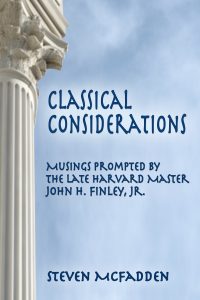Areté is a Greek term that describes moral virtue. It’s used to denote excellence in any field of endeavor, the fulfillment of a person’s potential. So it was for the late John H. Finely, Jr. So it is in Classical Considerations, one of the slender volumes in my Soul*Sparks series of small treasures.
Life’s foundational questions come elegantly to the fore in Classical Considerations, a nonfiction mini biography of Finley. For 51 years he was the celebrated and erudite Eliot Professor of the Classics at Harvard.
Luminous and compellingly relevant, his story leads readers directly into engagement with the fundamental wisdom questions of a worthwhile life.
Classical Considerations offers a compact but lyrical array of intellectual sparks to kindle a warming and illuminating fire in every reader’s soul.



 The other day while looking online at a model of our human DNA genetic code I had an insight that I felt was worth noting. As a consequence I added some new sentences to my nonfiction book,
The other day while looking online at a model of our human DNA genetic code I had an insight that I felt was worth noting. As a consequence I added some new sentences to my nonfiction book,  “Likewise, as many millions of people have their DNA tested out of genealogical curiosity, we are discovering the fundamental reality of how complex and multifaceted are the whirling double-helix strands of genes that give evidence of each person’s multicultural lineage. These DNA molecules embody the inherited instructions that an organism – such as a human being – needs to develop, live and reproduce. These instructions are found inside every cell, and are passed down from parents to their children.
“Likewise, as many millions of people have their DNA tested out of genealogical curiosity, we are discovering the fundamental reality of how complex and multifaceted are the whirling double-helix strands of genes that give evidence of each person’s multicultural lineage. These DNA molecules embody the inherited instructions that an organism – such as a human being – needs to develop, live and reproduce. These instructions are found inside every cell, and are passed down from parents to their children.







